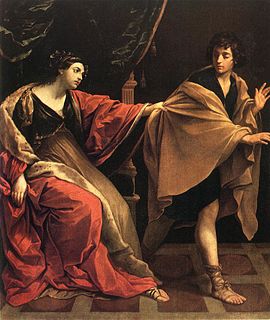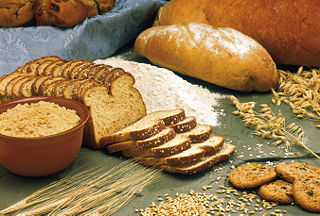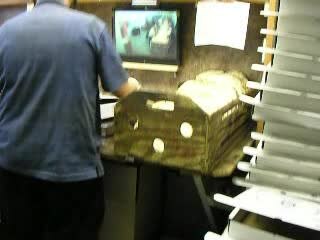Related Research Articles

Marriage in Judaism is the documentation of a contract between a Jewish man and a Jewish woman in which God is involved. In Judaism, a marriage can end either because of a divorce document given by the man to his wife, or by the death of either party. Certain details, primarily as protections for the wife, were added in Talmudic times.
Kashrut is a set of dietary laws dealing with the foods that Jewish people are permitted to eat and how those foods must be prepared according to Jewish law. Food that may be consumed is deemed kosher, from the Ashkenazic pronunciation (KUHsher) of the Hebrew kashér, meaning "fit".

Ner Israel Rabbinical College, also known as NIRC and Ner Yisroel, is a Haredi yeshiva in Pikesville, Maryland. It was founded in 1933 by Rabbi Yaakov Yitzchok Ruderman, a disciple of Rabbi Nosson Tzvi Finkel, dean of the Slabodka yeshiva in Lithuania. It is currently headed by Rabbi Aharon Feldman, a disciple of Rabbi Ruderman and a member of the Moetzes Gedolei HaTorah of America.

A mashgiach or mashgicha is a Jew who supervises the kashrut status of a kosher establishment. Mashgichim may supervise any type of food service establishment, including slaughterhouses, food manufacturers, hotels, caterers, nursing homes, restaurants, butchers, groceries, or cooperatives. Mashgichim usually work as on-site supervisors and inspectors, representing a kosher certification agency or a local rabbi, who actually makes the policy decisions for what is or is not acceptably kosher. Sometimes certifying rabbis act as their own mashgichim; such is the case in many small communities.

Kosher wine is wine that is produced in accordance with halakha, and more specifically kashrut, such that Jews will be permitted to pronounce blessings over and drink it. This is an important issue, since wine is used in several Jewish ceremonies, especially those of Kiddush.

Kosher foods are foods that conform to the Jewish dietary regulations of kashrut, the Jewish dietary law is primarily derived from Leviticus 11 and Deuteronomy 14:1-21. Foods that may be consumed according to halakha are termed kosher in English, from the Ashkenazi pronunciation of the Hebrew term kashér, meaning "fit". Foods that are not in accordance with Jewish law are called treif meaning "torn."

Jewish cuisine refers to the worldwide cooking traditions of the Jewish people. During its evolution over the course of many centuries, it has been shaped by Jewish dietary laws (kashrut), Jewish festivals and holidays, and traditions centred around Shabbat. Jewish cuisine is influenced by the economics, agriculture, and culinary traditions of the many countries where Jewish communities have settled and varies widely throughout the entire world.

Cholent or hamin is a traditional Jewish stew. It is usually simmered overnight for 12 hours or more, and eaten for lunch on Shabbat. Cholent was developed over the centuries to conform with Jewish laws that prohibit cooking on the Sabbath. The pot is brought to a boil on Friday before the Sabbath begins, and kept on a blech or hotplate, or left in a slow oven or electric slow cooker, until the following day. Cholent originated in ancient Judea, possibly as far back as the Second Temple period, and over the centuries various Jewish diaspora communities created their own variations of the dish.
Negiah, literally "touch", is the concept in Jewish law (Halakha) that forbids or restricts sensual physical contact with a member of the opposite sex except for one's spouse, outside the niddah period, and certain close relatives to whom one is presumed not to have sexual attraction. A person who abides by this halakha is colloquially described as a shomer negiah.

In Jewish religious law (halakha), the laws of yichud prohibit seclusion in a private area of a man and a woman who are not married to each other. Such seclusion is prohibited out of fear that sexual intercourse or other, lesser acts may occur. A person who is present in order to prevent yichud is called a shomer.
Chametz are foods with leavening agents that are forbidden on the Jewish holiday of Passover. According to halakha, Jews may not own, eat or benefit from chametz during Passover. This law appears several times in the Torah; the punishment for eating chametz on Passover is the divine punishment of kareth.

The Islamic dietary laws (halal) and the Jewish dietary laws are both quite detailed, and contain both points of similarity and discord. Both are the dietary laws and described in distinct religious texts: an explanation of the Islamic code of law found in the Quran and Sunnah and the Jewish code of laws found in the Torah, Talmud and Shulchan Aruch.

Chalav Yisrael, also pronounced cholov Yisroel, refers to kosher milk whose milking was observed by an observant Jew. The halakha of chalav Yisrael, which originates in the Mishnah and Talmud, was instituted to ensure that no non-Jew would mix milk of a non-kosher animal with the kosher milk. Today, many kosher-keeping Jews rely on the ruling of Rav Moshe Feinstein, who argues that since countries such as the United States have strict laws against mixing milks, it can be assumed that the milk is kosher.
Terefah refers to either:

Many Jews who strictly observe Shabbat refrain from using electrical devices on Shabbat, with the exception of passive enjoyment of devices which were set up before Shabbat. Various rabbinical authorities have pronounced on what is permitted and what is not, but there are many disagreements in detailed interpretation, both between different individual authorities and between branches of Judaism.

Sabbath food preparation refers to the preparation and handling of food before the Sabbath, beginning at sundown Friday concluding at sundown Saturday, the Bible day of rest, when cooking, baking, and the kindling of a fire are prohibited by the Jewish law.
Mixtures of milk and meat are forbidden according to Jewish law. This dietary law, basic to kashrut, is based on two verses in the Book of Exodus, which forbid "boiling a (goat) kid in its mother's milk" and a third repetition of this prohibition in Deuteronomy.

In Jewish law, Pas Yisroel or Pat Yisrael products are grain-products that were cooked or baked with the participation of an observant Jew.

The gift of the foreleg, cheeks and maw of a kosher-slaughtered animal to a kohen is a positive commandment in the Hebrew Bible. The Shulchan Aruch rules that after the slaughter of animal by a shochet, the shochet is required to separate the cuts of the foreleg, cheek and maw and give them to a kohen freely, without the kohen paying or performing any service.

In Judaism, the dough offering is a positive commandment requiring the owner of a bread dough to give a part of the kneaded dough to a kohen. The obligation to separate the dough offering from the dough begins the moment the dough is kneaded, but may also be separated after the loaves are baked. This commandment is one of the twenty-four kohanic gifts, and, by a biblical injunction, is only obligatory in the Land of Israel, but from a rabbinic injunction applies also to breadstuffs made outside the Land of Israel.
References
- 1 2 3 Heinemann, Moshe (20 August 2013). "Food fit for a king: Reviewing the Laws of Bishul Akum & Bishul Yisroel". Star-K . Retrieved April 27, 2018.
- ↑ "Keeping Kosher in a Non-Kosher World". www.shemayisrael.co.il. Archived from the original on May 9, 2008. Retrieved May 15, 2008.
- 1 2 3 4 Jachter, Howard (February 1, 2003). "Bishul Akum". Kol Torah . Retrieved April 27, 2018.
- ↑ Luban, Yaakov (4 May 2004). "Playing with Fire". Orthodox Union . Retrieved April 27, 2018.
- ↑ Posner, Menachem. "Is a non-Jewish housekeeper permitted to turn on the oven or stove?". Chabad.org . Retrieved April 27, 2018.